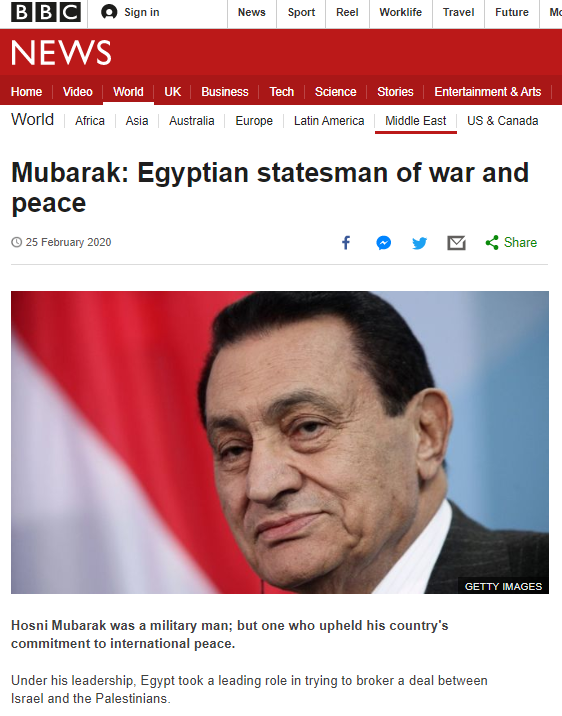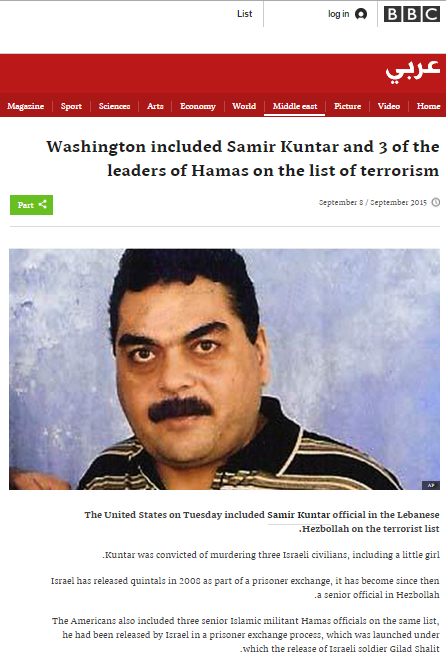When, on September 5th, Israel’s High Court ruled that an order suspending the demolition of the illegally constructed encampment of Khan al Ahmar would be lifted in seven days, the BBC’s London-based Middle East editor obviously smelt a story. As seen here earlier, he travelled to Israel and produced an audio report on the story on September 13th.
BBC’s Bowen recycles the ‘contiguity’ myth on World Service radio
The demolition order was not carried out on September 13th but a few recently placed shipping containers were removed. The following day bulldozers were brought in to remove barriers of rocks which had been set up by local and foreign activists to hamper the still pending demolition process.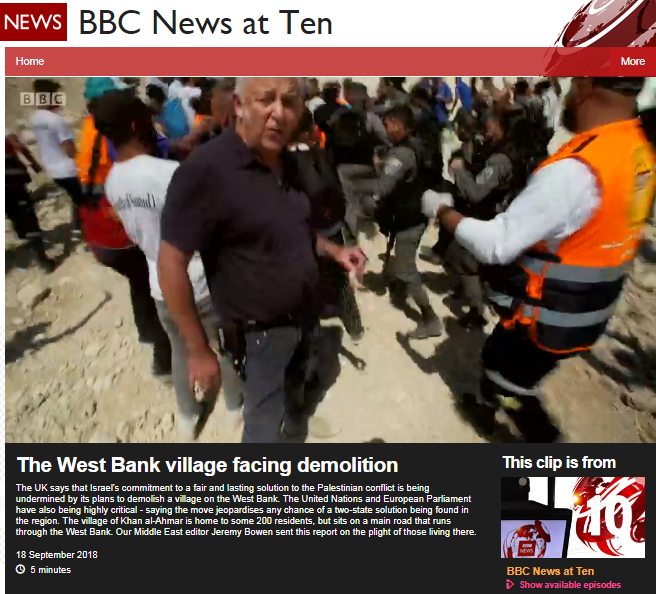
Jeremy Bowen and his crew were present in Khan al Ahmar on September 14th and three days later, a filmed report titled “The West Bank village facing demolition” was aired on ‘News at Ten’ on BBC One and the BBC News channel.
“The UK says that Israel’s commitment to a fair and lasting solution to the Palestinian conflict is being undermined by its plans to demolish a village on the West Bank. The United Nations and European Parliament have also being highly critical – saying the move jeopardises any chance of a two-state solution being found in the region. The village of Khan al-Ahmar is home to some 200 residents, but sits on a main road that runs through the West Bank. Our Middle East editor Jeremy Bowen sent this report on the plight of those living there.”
In that filmed report Bowen recycled narratives and deliberate omissions previously seen in his radio report. Once again BBC audiences were not informed that Khan al Ahmar is located in Area C which, under the terms of the Oslo Accords, is under Israeli control pending final status negotiations. Once again he amplified a narrative suggesting that the Jahalin Bedouin tribe had arrived in the area over sixty years ago– despite contradictory evidence. And yet again Bowen did not bother to inform BBC audiences that the Bedouin make no claim to own the land on which they erected their encampment. [emphasis in italics in the original, emphasis in bold added]
Bowen: “In this conflict disputes that look small come with big consequences. It’s dawn in the Judean Desert – occupied by Israel, claimed by Palestinians as part of a future state. In the village of Khan al Ahmar it’s time for Hussam, Kassem and Asil – sleeping outside as it’s still hot – to get up for school. Their mother is making breakfast. Their Palestinian Bedouin community settled here after they were expelled from the new State of Israel in the 1950s. But now the Israeli Supreme Court has ruled that the village was built without permission so the state can demolish it.”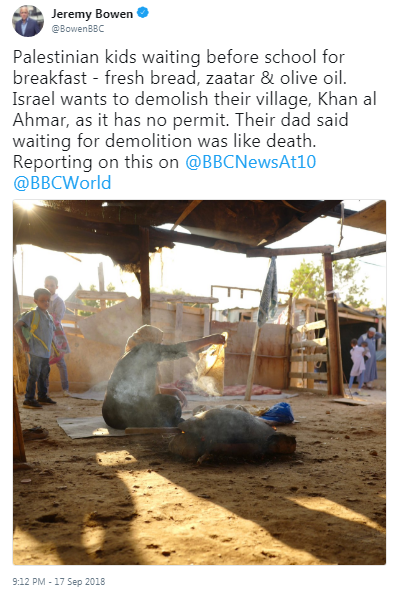
Viewers then heard from a person described as the “village preacher”.
Abu Dahook: “It is as if we are waiting to die. That is easier than being forced out of our home to an unknown fate.”
Yet again Bowen did not bother to clarify to viewers that, far from facing an “unknown fate”, the residents of Khan al Ahmar have been offered free plots of land with already existing connections to utilities close by – at a cost of over $2 million to the Israeli tax payer.
Once again ignoring photographic evidence, Bowen repeated the narrative according to which the encampment existed before 1967, while inaccurately claiming that it is ‘surrounded’ by “Jewish settlements” and giving viewers a partisan representation of “international law”.
Bowen: “Khan al Ahmar was established before Israel seized this territory. It’s almost impossible for Palestinians to get building permits here. The UN says Israel discriminates in favour of Jewish settlements which surround the village and are illegal under international law.”
Misrepresenting what the bulldozers were doing at the site on September 14th Bowen went on:
Bowen: “Israeli forces try to block off an access road. Tension has risen since the village lost its final appeal. It’s a ritual after more than 50 years of occupation. Palestinians and their supporters protest. With its military, bureaucratic and political power, Israel prevails. This is a very nasty scuffle. Not lots of people involved but it’s very symbolic and all this is important because it’s about control of this land. Not just now, but in the future. Everything that happens here is politicised and deeply connected to this long and very bitter conflict.”
He then introduced a topic unrelated to the Khan al Ahmar case – which he refrained from telling BBC audiences has been the topic of court cases for the past nine years.
Bowen:”And now there’s President Trump. He’s Israel’s cheerleader; recognising Jerusalem as its capital, expelling Palestinian diplomats from the US and cutting aid to refugees. He’s targeted Palestinian hospitals in Jerusalem, ending a $25 million grant. Pediatric dialysis and cancer wards have lost a quarter of their budgets. Lives, they say, are at risk.”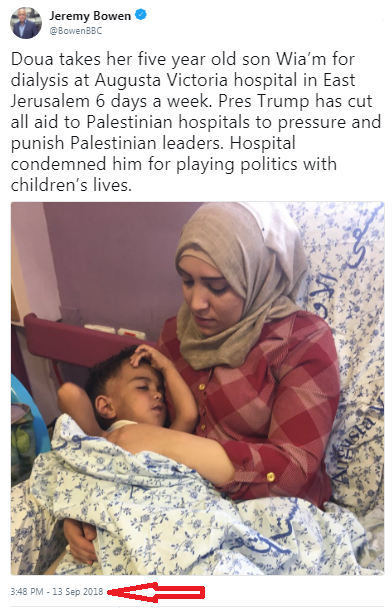
Viewers next saw an interview with a hospital official apparently filmed on September 13th.
Nammour: “You know we could not believe that, you know, sick children – children with cancer – will be used by any [unintelligible], by an American government. It’s incredible.”
Bowen: “Well the Americans say it’s Palestinians’ fault for not taking part properly in talks and also for taking cases to the International Criminal Court.”
Nammour: “Yeah but I mean why would?…this is politics. Why would a child who has cancer pay the price?”
Neither Bowen nor his interviewee bothered to inform viewers that by September 9th – the day after the US announcement and at least four days before this interview was filmed – the Palestinian Authority had already announced that it would make up the deficit.
Declining to tell BBC audiences which “major concessions” Palestinians have already made, Bowen went on:
Bowen: “On their side of the Jerusalem wall, for the Israelis these are days that smell like victory. Pressure, President Trump believes, will push the Palestinians into more major concessions. The danger is that one-sided coercion could mean violence, not peace.”
Viewers then saw part of an interview with Israel’s Minister of Education which was also promoted separately on the BBC News website along with another version of this report.
Bennett: “President Trump has brought fresh thinking to a region that’s been fairly stagnant in terms of its methodologies and ideas.”
Bowen: “But do you think it’s a good idea to take some really quite severe actions which actually hurt ordinary people and not leaderships?”
Bennett: “Well what Trump is telling the Palestinians: if you think you’ll continue inciting against Jews and killing Jews and somehow time is on your side, you’re wrong. You’ve got to act. You’ve got to move. Let’s make peace. Don’t wait on the sidelines because time is not on your side.”
Bowen closed his report with amplification of the notion that the relocation of squatters from an illegally constructed encampment on land to which they have no claim is a “war crime”.
Bowen: “Down the desert road from Jerusalem the big issues of the conflict are in play. The UN and the Red Cross say forcing the people of Khan al Ahmar out of their village would be a war crime. But at the heart of this are families losing homes, children losing their school and pain for yet another generation.”
Notably the BBC’s Middle East editor – whose job it is to “make a complex story more comprehensive or comprehensible for the audience” – chose yet again not to tell the BBC’s funding public that the EU has also carried out illegal construction at Khan al Ahmar and other sites in the vicinity or that the Palestinian Authority and various NGOs have for years used the encampment’s residents as political pawns.
To do so would of course hamper the narrative to which Jeremy Bowen has self-conscripted and which he elected to promote in this report as well as subsequent ones which will be discussed in part two of this post.
Related Articles:
BBC’s Bowen recycles the ‘contiguity’ myth on World Service radio
Omission and imbalance in BBC report on ‘Bedouin village’
THE LA TIMES, THE BEDOUIN OF KHAN AL AHMAR AND ‘THEIR LAND’ (CAMERA)

